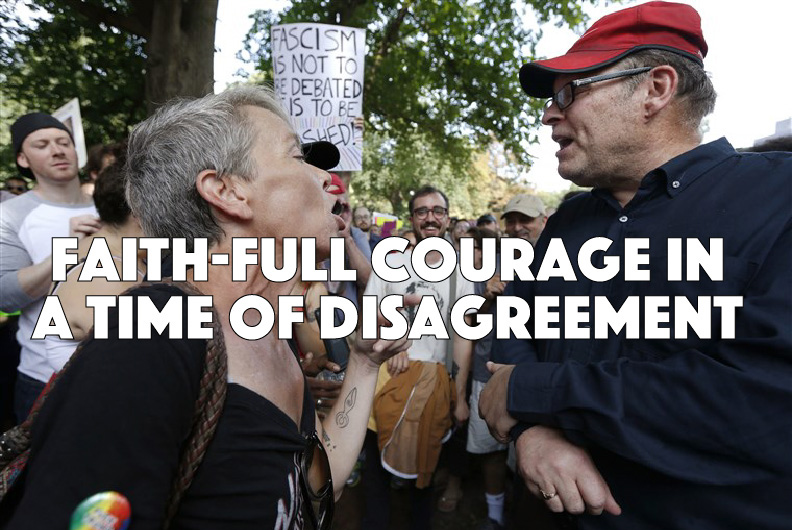
In the tumultuous division of today, it’s often that we find ourselves face to face with someone close to us (family, friends, church brothers & sisters, co-workers) with whom we fiercely disagree about politics, local events, history, and even theological stances. It can be tongue-tyingly uncomfortable, leave us shaking with indignation or mute with dumbfoundedness. The actress and activist America Ferrera points out in an interview that “our discomfort and our grappling is not a sign of failure. It’s a sign that we’re living at the edge of our imaginations.”
How do we talk with one another? How do we (re)learn to talk with one another whether we wear MAGA hats, are at a protested school board meeting, in a church fight, or sitting down at the Thanksgiving Table with those people who think…. My the key to having courage in such moments of disagreement and courage is more connected to imagination than a strong-back bone or a silenced tongue?
The Psalm for today is a community prayer for God’s renewed mercy and love. The four chief attributes of God: steadfast love (mercy), faithfulness (truth), righteousness (justice), and peace meet together like people greeting each other with a kiss. Such a meeting might be hard for us to imagine today without shouting, protests signs, or threats. In the gospel story of Jesus being confronted by his adversaries in public with a tricky test, he responds with courageous imagination. His adversaries, which themselves disagree on working with and working to overthrow the occupying Roman powers, come to trap Jesus into outing himself publicly as a collaborators of Rome, a hypocrite who doesn’t practice what he preaches, or a revolutionary seeking to overthrow the government. Jesus responds by asking them to produce a coin with which the questioned taxes would be paid. He both judge and love them, to show great mercy and hold fast to clear truth.
The root of the word courage is cor – the Latin word for heart. In one of its earliest forms, the word courage meant “To speak one’s mind by telling all one’s heart.” Over time, this definition has changed, and today, we typically associate courage with heroic and brave deeds. Responding with courage is responding from the way of the heart. Curiously the Hebrew word for courage means “listen and repeat” – it’s about an active engagement, a willingness to take action. Those two notions behind the word courage lead to imagination.
Like the Ancient Israelites, we live in a time of Exile in that the world is not what we thought, imagined and believed. We can feel threatened by that foreignness. We can respond by withdrawing, complicit indifference, embracing it or resisting it. Jesus teaches a way of creative imagination – imagining a different outcome or reality than the limited one that seems unavoidable. He does so from the heart, with courage, willing to act upon, to live into the world in which he believes, believing that there is good in the other person who also is created in the holy image of God.
Questions for the practice of Examen & Contemplation
- What word, phrase or image grabs your attention?
- How do you struggle to be imaginative in disagreement?
- What invitation to do you hear in this word for you / us?
Download the Text Study Guide PDF that we’ll use in our group discussion at @CAPCOakland [HERE].